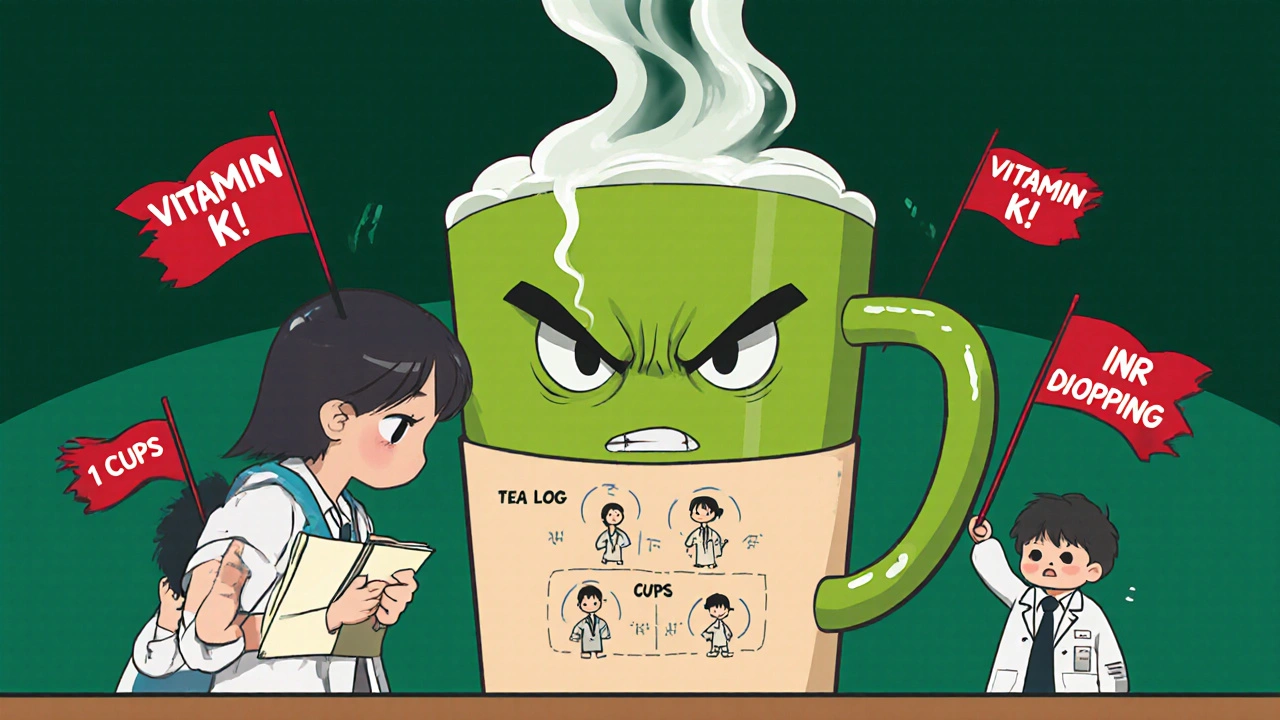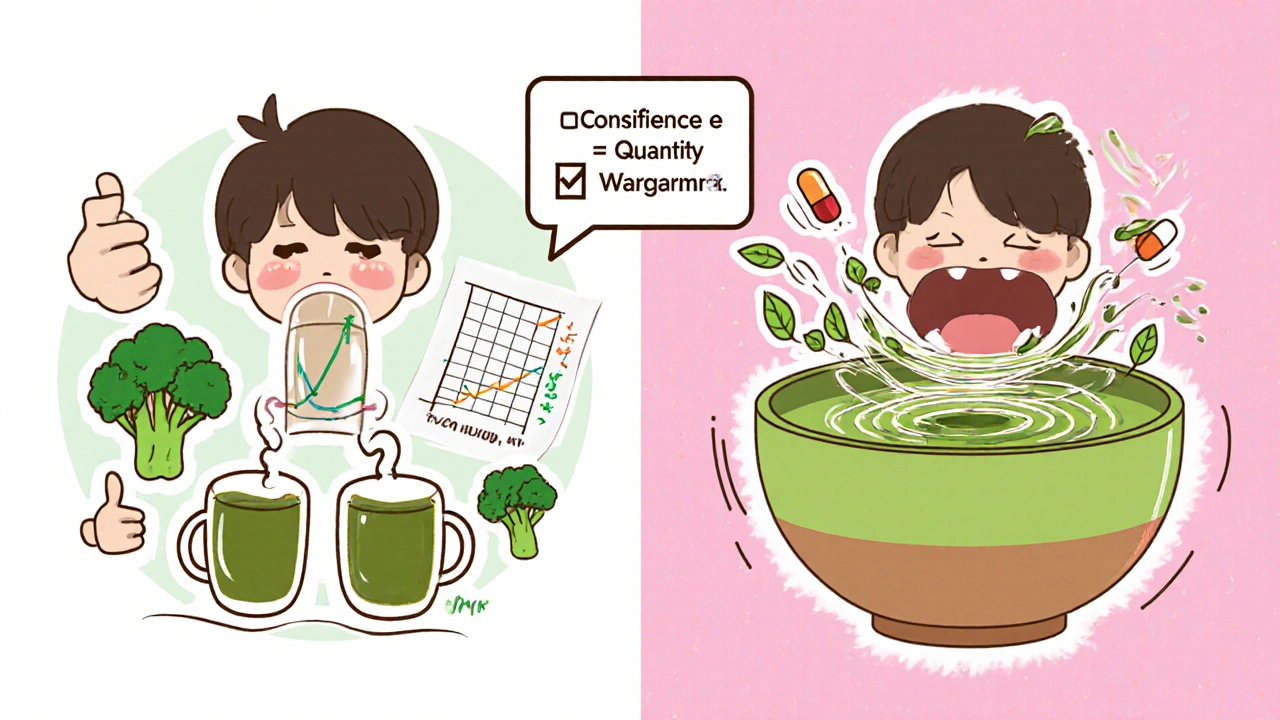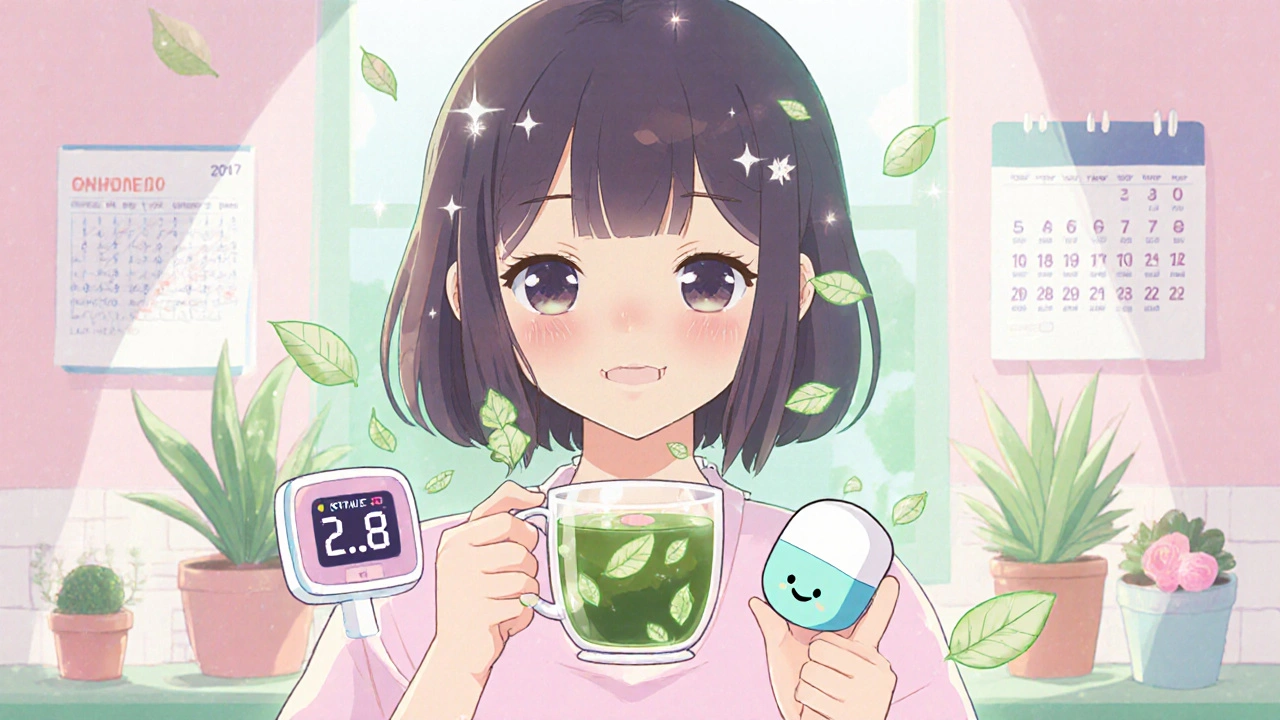Warfarin Green Tea Impact Calculator
Your Green Tea & Warfarin Calculator
Determine how your green tea consumption impacts your INR levels while taking warfarin. Enter your current INR and tea intake for personalized guidance.
If you're taking warfarin, you've probably heard to watch your diet. But what about green tea? It's healthy, calming, and full of antioxidants-so why would it matter? Turns out, it can seriously affect your blood clotting. For people on warfarin, drinking too much green tea can drop your INR, putting you at risk for clots. Drink too little after regularly having it, and your INR might spike, raising bleeding risk. This isn't a myth. It's a documented, real interaction backed by case reports, clinical guidelines, and patient experiences.
How Warfarin Works-and Why Vitamin K Matters
Warfarin, sold under brand names like Coumadin and Jantoven, works by blocking vitamin K from doing its job. Vitamin K is essential for making clotting factors II, VII, IX, and X. Without enough active vitamin K, your blood takes longer to clot. That’s the whole point-if you have atrial fibrillation, a mechanical heart valve, or a history of blood clots, you need your blood to thin just enough to prevent dangerous clots without causing dangerous bleeding.
Your doctor tracks this balance using the INR test. A normal INR is around 1.0. For most people on warfarin, the target is between 2.0 and 3.5. Too low? Clot risk goes up. Too high? Bleeding risk spikes. Keeping it steady is the goal. And that’s where green tea comes in.
Green Tea Has Vitamin K-But Not Much in a Cup
Green tea leaves are packed with vitamin K-about 1,428 micrograms per 100 grams of dried leaves. But here’s the catch: when you brew tea, most of that vitamin K stays in the leaves. The brewed tea? Only about 0.03 micrograms per 100 grams. That’s less than 1% of what’s in the leaves.
So if you drink one or two cups a day, you’re getting maybe 0.07 micrograms of vitamin K. Compare that to a cup of cooked spinach, which has 145 micrograms, or half a cup of broccoli at 110 micrograms. Green tea, in normal amounts, isn’t a major source of vitamin K.
But that’s only true for regular brewed green tea. Matcha is different. Matcha is powdered green tea-you’re drinking the whole leaf. That means you’re consuming all the vitamin K. One gram of matcha powder can have up to 10-20 times more vitamin K than brewed green tea. So if you’re sipping matcha lattes daily, you’re not just having a trendy drink-you’re changing your blood’s ability to clot.
Case Reports Show Real-World Problems
In 2006, a 44-year-old man was on 7.5 mg of warfarin daily. His INR was stable at 3.79. Then he started drinking half a gallon to a full gallon of green tea every day. Within weeks, his INR crashed to 1.37. That’s dangerously low. He wasn’t bleeding, but he was at high risk for stroke or clotting. Once he cut back on tea, his INR returned to normal. This case was published in a medical journal and became a key reference for doctors.
More recently, a Reddit user named ClotFreeSince2018 reported drinking four cups of matcha daily for two weeks. His INR dropped from 2.8 to 1.9. He had to increase his warfarin dose by 15% to get back in range. Another user on PatientsLikeMe, who drank over 500 mL of green tea daily, saw their INR fluctuate after switching from regular tea to matcha. These aren’t rare. They’re common enough that clinics now track green tea intake in their anticoagulation logs.

It’s Not Just Vitamin K-There’s a Paradox
Green tea doesn’t just contain vitamin K. It’s also full of catechins, especially EGCG, which have been shown in lab studies to inhibit platelet activity. That means they might make your blood thinner, not thicker. So theoretically, green tea could both increase and decrease warfarin’s effect.
That’s why the interaction is so confusing. One study in the Journal of Thrombosis and Haemostasis found green tea catechins blocked arachidonic acid release, reducing platelet clumping. That could enhance warfarin’s effect. But in real life, most people who have problems are drinking large amounts of green tea and seeing their INR drop-not rise.
The bottom line? The vitamin K effect dominates in high doses. The antiplatelet effect is real, but it’s weaker and inconsistent. For most people, the vitamin K is the main issue.
How Much Is Too Much?
There’s no single answer, but guidelines are clear on thresholds:
- 1-3 cups (240-720 mL) per day: Generally safe. No dose changes needed. This is what the American Heart Association recommends.
- 500 mL-1,000 mL per day: Monitor INR more closely. If you’re drinking this much regularly, your doctor should check your INR every two weeks instead of monthly.
- Over 1,000 mL per day (more than a quart): High risk. This is when INR drops become common. You’ll likely need a warfarin dose increase.
- Matcha daily: Treat it like a high-vitamin K food. Even one cup can be equivalent to several cups of brewed tea. Track it closely.
Also, don’t switch back and forth. If you normally drink two cups a day and suddenly stop, your INR could rise. If you go from one cup to five, your INR could drop. Consistency matters more than avoidance.
What About Other Teas and Herbal Drinks?
Black tea? Same as green tea-low vitamin K in brewed form. But if you drink gallons of it daily, you’ll see the same effect. Herbal teas? That’s where things get risky.
Ginkgo biloba tea? Can increase bleeding risk by affecting platelets. Goji berry tea? One documented case caused dangerous bleeding in a warfarin user. Cranberry juice? That one consistently raises INR by interfering with how warfarin is broken down in the liver. Unlike green tea, cranberry juice is a no-go.
And don’t forget alcohol. Heavy drinking can raise INR. Even moderate amounts can interfere with liver metabolism. The same advice applies: keep it steady. Don’t binge on weekends.

What Should You Do?
Here’s what works in real life, based on clinic guidelines and patient outcomes:
- Don’t quit green tea cold turkey. If you’ve been drinking it regularly, keep doing it. Stopping suddenly can spike your INR.
- Choose one amount and stick to it. One cup? Two? Fine. Just don’t jump from one to five.
- Avoid matcha unless you’re tracking it. If you love matcha, tell your doctor. You may need more frequent INR checks.
- Log your intake. Use a notebook or an app like WarfarinWise. Track how much you drink and when your INR changes.
- Call your doctor if you change your tea habit. Even small shifts can matter. A 15% dose change isn’t unusual after switching to matcha.
Most people who drink 1-3 cups of brewed green tea daily have no issues. The problem isn’t green tea-it’s inconsistency and high doses. You don’t have to give it up. You just have to be smart about it.
Why This Matters More Than You Think
Every year, over 2.5 million Americans take warfarin. About 18% of them drink green tea regularly. That’s nearly half a million people. And according to the National Blood Clot Alliance, 62% of warfarin users didn’t know green tea could affect their INR until they had a problem.
INR instability leads to hospitalizations. In 2022, dietary factors contributed to nearly 19% of warfarin-related hospital stays in the U.S.-costing Medicare over $78 million. Most of those cases were preventable.
Green tea isn’t the enemy. But treating it like a harmless herbal drink? That’s the mistake. It’s a medication interaction with real consequences. And the solution isn’t fear-it’s awareness.
What About New Blood Thinners?
Doctors are moving toward newer anticoagulants like apixaban, rivaroxaban, and dabigatran. These don’t interact with vitamin K. So if you’re on one of these, green tea is fine. No limits.
But here’s the catch: warfarin is still the go-to for mechanical heart valves and some kidney conditions. And it’s cheaper. So for many people, it’s not a choice-it’s the only option. That means this interaction isn’t going away anytime soon.
Even if you’re on a newer drug, always check with your doctor before mixing supplements or herbal teas. Some can still interfere. But for green tea and warfarin? The rules are clear.
Can I drink green tea while on warfarin?
Yes, but only in moderation-1 to 3 cups of brewed green tea per day is generally safe. Avoid matcha unless you’re closely monitoring your INR. The key is consistency: don’t suddenly start drinking a lot, and don’t quit if you’ve been drinking it regularly.
Does green tea lower or raise INR?
Large amounts of green tea-especially matcha or over 1 liter daily-can lower INR because of its vitamin K content, which counteracts warfarin. In rare cases, catechins in green tea might slightly raise INR by reducing platelet activity, but this effect is weak and inconsistent. Vitamin K is the dominant factor.
How much green tea is dangerous with warfarin?
Drinking more than 1 liter (about 4 cups) per day increases risk. If you consume over 500 mL daily, your doctor should check your INR every two weeks. Matcha is especially potent-just one cup can be equivalent to 10 cups of brewed tea.
Should I stop drinking green tea if I’m on warfarin?
No, unless your doctor tells you to. Stopping suddenly can cause your INR to rise, increasing bleeding risk. The goal is consistency, not elimination. Stick to your usual amount and avoid big changes.
What should I do if my INR changes after drinking green tea?
Contact your anticoagulation clinic or doctor right away. Don’t adjust your warfarin dose yourself. Bring a log of your tea intake, including type (brewed vs. matcha) and amount. Your doctor may need to check your INR sooner and adjust your dose based on your pattern.



Comments
Just started drinking green tea last month and didn't realize it could mess with my INR. I'm on warfarin for AFib and drink about 2 cups a day-glad I read this before I went full matcha latte queen. Will keep it steady and log it. Thanks for the clarity!
Let me guess-you're one of those people who thinks nature is always safe and pharmaceuticals are the devil. Green tea is a plant. Plants have bioactive compounds. Warfarin is a poison designed to thin blood. If you can't handle that, maybe you shouldn't be on it at all. Stop treating your medication like a suggestion.
So let me get this straight. I can drink a gallon of cranberry juice and die, but green tea? Only if I'm a tea monster. Cool. So the real danger is being too consistent? Sounds like a bad sitcom.
Thank you for this meticulously researched post. I have been on warfarin for seven years, and I drink three cups of brewed green tea daily-no matcha, no extremes. My INR has remained stable for over two years. Consistency, as you stated, is the cornerstone of anticoagulation management. I will continue this regimen, and I urge others to do the same, without fear, but with awareness.
Everyone's acting like this is some groundbreaking revelation. Newsflash: vitamin K counteracts warfarin. That's been known since the 1950s. Green tea has vitamin K? Shocking. Matcha has more? Groundbreaking. This isn't medicine-it's a blog post dressed up like a clinical guideline. Do people even read the medication leaflets anymore?
I appreciate how balanced this is. I used to panic every time I drank tea, thinking I was going to have a stroke or bleed out. But the key takeaway-consistency-is so simple, and yet so many people overlook it. I switched from coffee to green tea last year, stuck to two cups, and never had an issue. It’s not about fear. It’s about awareness and routine.
I drank 3 liters of green tea in one week because I thought it "detoxed" me. My INR crashed to 1.1. I ended up in the ER with a clot near my knee. I thought I was being healthy. Turns out I was being stupid. This post saved me from doing it again. Thank you. I now drink one cup. Every day. No excuses.
As a clinical pharmacist specializing in anticoagulation, I can confirm the data presented here is accurate and clinically significant. The interaction between green tea (particularly matcha) and warfarin is well-documented in the literature, including in the American College of Clinical Pharmacy guidelines. The key clinical principle is not avoidance, but stability: patients who maintain consistent dietary intake of vitamin K-containing substances-including green tea-have significantly fewer INR fluctuations and hospitalizations. I routinely counsel patients to log their tea consumption, especially when transitioning from brewed to powdered forms. Matcha is not inherently dangerous-but its potency is frequently underestimated. Consistency, documentation, and communication with the anticoagulation team remain the pillars of safe management.